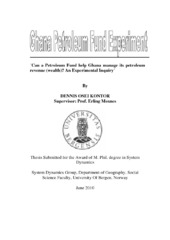Ghana Petroleum Fund Experiment. ´Can a Petroleum Fund help Ghana manage its petroleum revenue (wealth)? An Experimental Inquiry´
Master thesis
Permanent lenke
https://hdl.handle.net/1956/4306Utgivelsesdato
2010Metadata
Vis full innførselSamlinger
- Department of Geography [634]
Sammendrag
Ghana starts petroleum production and export business in the third quarter of2010. The management of the petroleum tax revenue is seen as timely fiscalpolicy decisions by the government and its partners. These policy decisions couldeither lead to a “blessing”; managing the revenue well or a “curse”; mismanagingthe revenue, if right decisions are not taken. Studies also show that peoplecommonly misperceive the dynamics of a system when making decisions,resulting to poor outcomes of their decisions.The following hypotheses were made: first, policy makers in Ghana willmismanage its petroleum tax revenue through a Fund- ‘curse’. Second, policymakers will misperceive the dynamics of a petroleum economy while makingspending decisions. Third, misperceptions lead to a cyclical development of thetotal capacity utilisation.A system dynamics model-based experiment was carried out in Ghana to testthese hypotheses. The model behind the experiment captured a simplemacroeconomic dynamics of a petroleum economy, which shares some essentialfeatures of Ghana’s economy. The experiment was supported with administeringof questionnaire, interviews and field data. Selected policy makers from the Bankof Ghana, Ministry of Finance and Economic Planning and the ParliamentaryCommittee on Finance formed the subjects of the experiments.The experimental output indicates a potential for policy makers in Ghanamanaging its petroleum tax revenue well through a Petroleum Fund. Most policymakers seemed to have based their spending decisions on the Fund inflows,leading to misperceptions of the dynamics of the petroleum economy. Thiscreated a cyclical development of the total capacity utilisation and other economicindicators. It is recommended that, a Petroleum Fund is established in Ghana witha strong fiscal policy and a discipline commitment attached to its management.
Utgiver
The University of BergenOpphavsrett
The authorCopyright the author. All rights reserved
Beslektede innførsler
Viser innførsler beslektet ved tittel, forfatter og emneord.
-
Loss of health certificates among offshore petroleum workers on the Norwegian Continental Shelf 2002-2010
Horneland, Alf Magne; Moen, Bente Elisabeth; Holte, Kari Anne; Merkus, Suzanne L.; Ellingsen, Kjersti Lunde; Carter, Tim; Aas, Randi Wågø; Ulven, Arne Johan (Peer reviewed; Journal article, 2011)Background: A health certificate is required to work on the offshore petroleum installations of the Norwegian Shelf. Loss of health certificate (“loss of licence”, LOL) may cause economic problems for the individual worker. ... -
Legal Regulatory Framework for the Sustainable Extraction of Australian Offshore Petroleum Resources. A Critical Functional Analysis
Hunter, Tina (Doctoral thesis, 2010-09-17)The sustainable development of petroleum resources in Australia forms the study of this thesis. Sustainable development in this thesis is defined as development that meets the needs of the present without compromising the ... -
Effect of Erroneous Representation of Location and Orientation of EM Receivers for Monitoring of Submarine Petroleum Reservoirs
Seyffarth, Hanne Christine (Master thesis, 2009-06-02)The receivers in electromagnetic monitoring should optimally be placed exactly in the same location during every single acquisition. However, for technological and economical reasons, the receivers are currently brought ...
